#invisible disabilities
Text
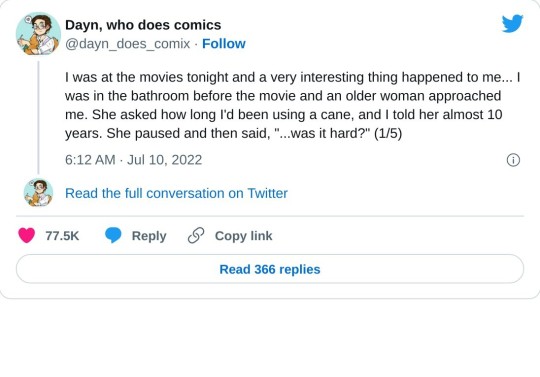

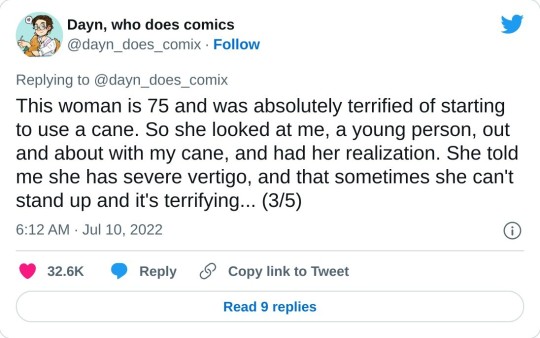
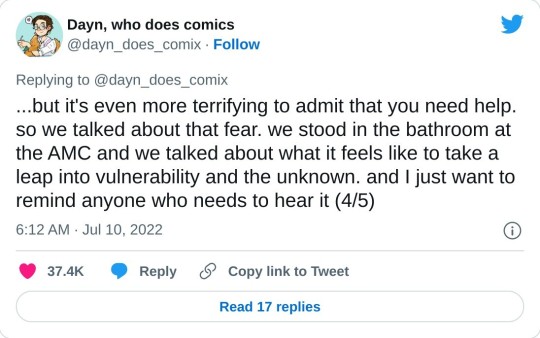
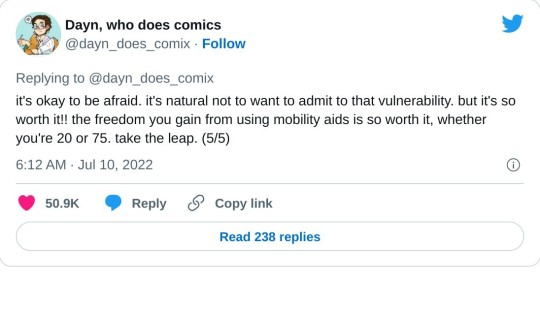
32K notes
·
View notes
Text
People on the schizophrenia spectrum are 14 times more likely to be victims of crime, not the perpetrators.
There is the ableist assumption that "schizophrenics are all dangerous", and a lot of people don't know how false that is.
Please help stop the stigma.
#schizophrenia#schizophrenia spectrum#mental health#mental illness#psychosis#actually schizophrenic#disability#disabled#disability justice#disability rights#neurodiversity#neurodivergence#invisible disabilities#invisible illness
728 notes
·
View notes
Text
"Do you really need that spot??"
No ma'am my disabled parking placard is purely for decor purposes.
2K notes
·
View notes
Text
I need some of you to stop thinking that being visibly disabled comes with some kind of inherent privilege. I need some of you to stop thinking people are less ableist to us because they can easily tell we’re disabled. I need some of you to stop using us as a prop in your discussions about other disabilities, saying shit like “You’d never say or do X to a visibly disabled person so why-.”
I need some of you to stop telling physically disabled people that they’re the most privileged in disabled spaces. I need some of you to stop coming into discussions specifically about physical disabilities and the ableism directed towards physically disabled people and then claiming we’re excluding you because you’re not currently being centered.
We are all disabled, all part of the same community. But that doesn’t mean you can’t be ableist towards other disabled people and I’m seeing a lot of you do it and it’s exhausting. So, take a minute, step back and think about it and stop.
#Disability education#ableism#physical disabilities#cripple life#fibro#chronic pain#chronic illness#actually neurodivergent#neurodiversity#mental illness#mental disabilities#actually disabled#actually mentally ill#spoonie#physically disabled#mentally disabled#chaos is speaking#invisible disabilities#There's numerous flipsides to this as well#ngl i already have one in my drafts lol#but this one's been driving me crazy so here we go
2K notes
·
View notes
Text
I hate being in this disability grey space. I'm well enough to work most of the time but that means I can't do anything else in my life. Disabled enough not to be able to keep up with others my age.
I'm constantly in pain and exhausted but well enough to have to push through to keep a job so I can afford to live and afford pain medicine and braces. I just subluxed my hip and am stuck in my wheelchair but I know I can't use my wheelchair at work cause I need my hands free. So, here I sit with a heating pad on my hip, sobbing and begging for the pain meds to help.
Just wish I were either fully abled or disabled enough to get help. Instead I'm stuck here. In the disabled grey space
#cripplepunk#chronic illness#chronic pain#chronic fatigue#chronically ill#ehlers danlos syndrome#pots#potsie#spoonie#fibromyalgia#actuallyautistic#autipunk#actually disabled#invisible disabilities#part time wheelchair user#ehlers danlos#ehlers danlos problems#ehlers danlos zebra#hypermobile ehlers danlos
308 notes
·
View notes
Text
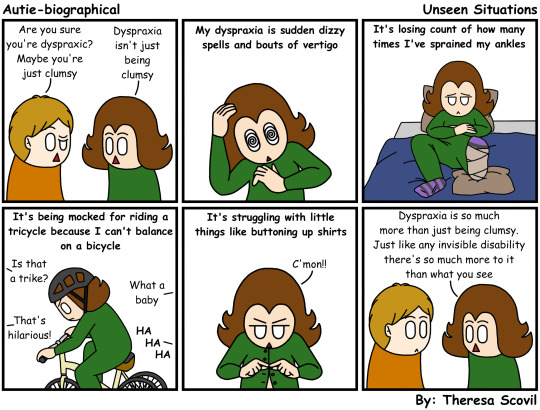
Someone saying "You don't look..." when it comes to a disability is just that person saying "I don't see your struggles, so I doubt your claim."
Invisible disabilities always have more going on than what others can see on the surface.
#autiebiographical#autie-biographical#actually autistic#autism#autistic#disabled#disabilties#invisible disability#invisible disabilities#dyspraxia#comic#comic strip#web comic#slice of life
580 notes
·
View notes
Text
Writing Visible vs Invisible Disabilities
Poll winner! Here goes. I would like to emphasize that my information and knowledge pertains specifically to the USA - I’m going to discuss some legal stuff with accommodations/disability equity that are super specific to America so if you are reading from/writing outside of the USA, you should probably conduct some of your own research on that.
Vocab
Invisible disability, hidden disability, or non-apparent disability are all terms used to describe a disability that is not readily measurable or apparent to sighted individuals. Invisible disability is the most commonly used, but non-apparent is felt to be the most neutral, as “hidden” implies a conscious secrecy and some so-called “invisible” disabilities do become visible or apparent in the right circumstances. Examples may include things like neurological conditions, chronic illnesses, mental illness, or autoimmune diseases.
Personal note: In this post I primarily use invisible disability because to me, it is the most common, and most recognizable. I also use non-apparent, because I think it’s specific and useful. I don’t use hidden because it does seem to carry value judgment, more so than invisible.
Visible disability is a term that describes a disability that is measurable or readily apparent to a sighted individual. Examples might include someone with a partial limb, muscular dystrophy requiring the use of a wheelchair, or a form of dwarfism resulting in a different body shape and size.
Multiple disabilities or multiply disabled refers to a person that has more than one disability.
Cross-disabled or cross-disability is a term that refers to organizations or concerns that apply broadly to people across the spectrum of ability and disability. This is as opposed to organizations or concerns that are specifically tailored or related to a particular disability.
The ADA, or Americans with Disabilities Act, is a piece of cross-disability legislation.
The SMA Foundation (Spinal Muscular Atrophy) is a single disability organization.
Passing is a term sometimes used to describe someone that is not in an identity group but can look or behave as though they do. An example might be a Deaf person using hearing aids to “pass” or be seen as hearing.
Nondisabled is a good neutral term for people that do not have disabilities. Abled or able-bodied is frequently used, but some see it as creating a hierarchy between abled and disabled people. Try to avoid words like “normal” or “healthy.”
Limb difference is a term describing the partial or complete absence, or malformation, of an arm or leg. This can be congenital (from birth) or acquired.
Facial difference is a term that describes anything above the neck that is visibly different from the majority of other people. I have a post about it that goes into much greater detail.
Self-disclosure means sharing something about oneself. In the context of disability, self-disclosure refers to the decision to share one’s disability status or diagnosis. Generally speaking, self-disclosure is a formal term and in my experience is used when referring to disclosing disability status or diagnosis as part of attending school, starting a new job, or otherwise requesting accommodations.
Access needs are something that a person needs to communicate, learn, or take part in an activity.
Support needs are sometimes used interchangeably with access needs, but can also refer to a person’s basic needs in order to live (eating, sleeping, bathrooming, etc.)
Accommodations is a term often used to describe legally mandated services provided to a person who has been diagnosed with a disability. These are most commonly in place at a person’s school or work and help a disabled person effectively complete tasks.
Access needs, support needs, and accommodations are similar in nature and are sometimes used interchangeably, but are not always the same thing. I know this is wildly confusing.
Generally speaking, the word “accommodations” (in regards to access) is used primarily in schools, and sometimes in professional working environments. Access needs are used more often in public or professional environments, and support needs in personal environments.
Some examples: Ramps are an access need. They can also be an accommodation, but an accommodation would more likely be phrased as “wheelchair-accessible classrooms or workspaces,” which could either be accessed through ramps or being on the bottom floor.
Assistance with handling finances is a support need. Extra time on tests is an accommodation.
Visible Disability Considerations
Before we get started: I am not saying these things only apply to those with visible disabilities. They may be more common for people with visible disabilities, but people with invisible disabilities could, and many have, experienced the same or similar things. I am not gatekeeping anything; I am just trying to organize this post.
Harassment in public. Someone who is visibly disabled may be openly stared at or subject to ableist abuse because people can tell that they have a disability. Most of what I have to say here relates to this, but there are some specifics I’m going to get into as well.
Being pitied. “Well-meaning” non-disabled people may try to do something “nice” for someone who they see as “less fortunate.” Assistance with things someone doesn’t need assistance with, comments about being brave or inspiring, or offers to pray for someone all fall under this category - all that and more, in fact.
Assumption of incompetence. Sometimes this means that people assume someone with a visible disability is automatically cognitively disabled. Sometimes it means that people believe a visibly disabled person is not capable of performing simple tasks. This can mean anything from being “helped” in a supermarket to being discriminated against when applying for work.
Ableism and discrimination. Everything listed is ableism and discrimination, but it’s worth saying outright. People with visible disabilities are often subject to ableist abuse, hiring discrimination, housing discrimination, and many other kinds of prejudice because they cannot mask or hide their disability, or pass as non-disabled.
People with invisible disabilities also suffer from ableism and discrimination. This is sometimes more common for people with visible disabilities, but can happen to anyone - even, actually, to non-disabled people who are thought to have a disability.
Inappropriate questions. Just because someone is visibly disabled does not mean that anyone is entitled to further information. Asking a stranger “what happened to them” or “what’s wrong with them” is always inappropriate, and is often inappropriate with coworkers or acquaintances as well. Your characters should know someone decently well and be able to gauge your disabled character’s comfort level before asking this kind of question.
Mobility aid policing. Mobility aids are visible, so users often fall under the visible disability umbrella. Sometimes, even though someone is using a mobility aid, random people in public decide they do not need it, or try to argue with them about faking it. Not being visibly disabled “enough,” or not being believed about being disabled, is still a problem for the visibly disabled.
Service dogs can be mobility aids, or other kinds of disability aids. People interacting with them, or trying to interact with them in public, also falls under this category.
Invisible Disability Considerations
Once again: I am not saying these things only apply to those with invisible disabilities. They may be more common for people with invisible disabilities, but people with visible disabilities could, and many have, experienced the same or similar things. I am not gatekeeping anything; I am just trying to organize this post.
Assumption of ability. Someone with an invisible disability may be assumed to be capable of everything a non-disabled person can do. They may have to repeatedly explain why they cannot do certain things or even why they do do things - like take pills, avoid certain foods, or rest more frequently than non-disabled peers. This ties into our next section -
Not being believed about severity or symptoms. People without visible or measurable disabilities can be disbelieved by strangers about their disability status, but also, very painfully, by friends, family, or medical professionals. Since a non-apparent disability may rely on self-report, other systemic biases may come into play here as well, like not believing someone because they’re a woman, or POC. People may also get comments like “you’re too young to be disabled,” “it’s all in your head,” or “you don’t look disabled.”
Again, this can and does also happen to visibly disabled people as well.
Being accused of lying or faking it. This is obviously the same as not being believed, but is a slightly different manifestation. This is when non-disabled people believe someone is faking having a disability in order to get attention or access to disability resources. Ignoring the fact that that is a completely unrewarding thing to do, this is a combination of disbelief, and suspecting the disabled person in question of intentional malice and selfishness. Again, this can be frustrating and incredibly painful.
Once again. Can and does happen to visibly disabled people.
When to self-disclose. Someone with an invisible disability gets more of a choice in if and when to talk about their disability. This means they have more control over who gets to know, when, how, what, and why, but also comes with problems of its own.
Telling new friends may come with concerns about being viewed or treated differently.
Telling a school or place of work may introduce the risk of scrutiny or discrimination.
Telling anyone risks potential ableism or alienation.
Asking for accommodations. Possibly more so than a visibly disabled person, a person with a non-apparent disability may have to self-disclose and then actively pursue the fulfillment of their support needs, access needs, or accommodations. I know many people who have voluntarily gone without the accommodations that they are legally entitled to, because they wanted to avoid shitty conversations about them and their needs.
Being able to go without one’s accommodations and “pass” for non-disabled can be viewed as a privilege, but going without one’s needed support needs, access needs, or accommodations can also be difficult, painful, and sometimes more impossible than a person realizes.
Resource policing. Some people may not be visibly disabled, but may still need resources like a service dog, an accessible parking pass, or use of the accessible bathroom stall. It is not at all uncommon for random people in public to see someone that they don’t think is disabled making use of a public resource for disabled people, and decide to say something about it.
Cross-Disability Considerations
What are your character’s support needs, access needs, and/or accommodations? If they don’t have any, why not?
How is your character perceived? Is their disability apparent to all, some, or none of the people around them? Under what circumstances might it become apparent?
How comfortable is your character with talking about their disability? Is it something that they take pride in, or something they would rather not be defined by? Does it feel very personal to them, or is it not that big of a deal? In what situations do they explain their diagnosis, and in what situations do they decide not to?
In what ways does ableism manifest, or not manifest, in your character’s life? Is there stigma attached to their diagnosis? Why or why not?
How does the medical establishment of your setting view your character’s disability or disabilities? How does that contrast with other disabilities? What is the reasoning behind this?
How does your character feel about medical interventions or cures? How much time/effort/money are they willing to put into medical interventions and cures, and why might that be?
Is your character part of a community or identity group centered around their disability? Do they know anyone with their same disability, or any disabilities at all? How does this community, or the lack of it, feel to them? How does the representation and kinship, or lack thereof, feel to them?
Rethink
This visibly disabled character has it harder than the invisibly disabled character. Or vice versa. Try not to set up hierarchies of suffering or ability. Non-apparent disabilities can be just as disabling, or more so, than visible disabilities. Setting up these two arbitrary categories in conflict is not really necessary, and is ableist no matter what direction it is in.
This character has accommodations/access needs/support needs but doesn’t use them or seem to truly need them. Why would your character have accommodations/access needs/support needs but not use them? Why might it seem “better” to not have these kinds of needs?
This character goes to great lengths to appear non-disabled. Again - why? Not saying you can’t do this, but think about what messages it sends and be intentional in the way you write this.
This character is visibly disabled, but can function exactly like a non-disabled person in every way. Exact same questions as above. Also - how realistic is this? Why might it be important or valuable to adhere to a non-disabled standard? What might be gained or lost?
Resources
As I have mentioned, I don’t like recommending media I haven’t personally read/watched/listened to, because I like to know what I’m recommending. In reviewing my own stuff, I don’t have much for invisible vs. visible resources. I have two books that are pretty general. If anyone else has media that fits with this post, please feel free to add it on!
Demystifying Disability by Emily Landau is a cross-disability primer on disability basics, etiquette, and disability justice. It’s a quick read that I highly recommend.
Disability Visibility, collected by Alice Wong, is a book of essays written by disabled people about their lives, thoughts, and experiences. It’s super engaging and informative, and I also highly recommend, particularly because these people are talking about their own lives in their own words.
#disability writing guide#invisible disabilities#visible disabilities#writing disabled characters#disability representation#representation matters#writing invisibly disabled characters#writing visibly disabled characters#invisible disabilities vs visible disabilities#disabled characters
144 notes
·
View notes
Text
How to make a cheap Migraine friendly lamp shade.
When starting out with migraines, I was extremely (and still am to a degree) photosensitive/photophobia. My lamp didn’t have a dial for its brightness, so I couldn’t dim it without either buying a new blackout lampshade or a new but dimmer lightbulb.
Instead, I grabbed a couple of sheets of black construction paper, duct tape, and used my current lampshade as the mold, and created a lampshade to go over my current one. It worked wonders! I didn’t use a cap on top due to a possible fire hazard, so I still have to angle the lamp shade carefully but it is much more bearable.
Here’s my finished product:

While it’s clearly uneven, it follows the “It’s not for fashion, it’s for function” mantra I have about migraines. You can feel free to add your own designs, I simply didn’t because I don’t have the energy or willpower for it.
#migraine#migraines#photosensitivity#photophobia#invisible disabilities#invisibledisabilities#photophobia problems#photosensitivity problems
27 notes
·
View notes
Text
i hate tiktok. why do u have to associate any joint or muscle problems with elderly people??? i have hEDS. just because i have to do hydrotherapy and physiotherapy because my body is significantly weaker than anyone else's my age does NOT mean that i'm a senior. you can have any disability at any age, why is it so hard for some of you to accept that?
adding onto the hEDS, i've seen people mentioning how they wish they were hypermobile. "ooh, contortionist this that" "wow!! i wish i was that flexible!" no you don't. no you fucking don't. you do not want to have to lose sleep because of how terribly fucking painful the aches in your joints are. you don't want to have a condition that makes you significantly more prone to injuries such as fractures, sprains and broken bones.
you do NOT want to have to be extremely fatigued and exhausted after a short walk. to feel dizzy or nauseous after running, exercising, almost any physical activity.
to be at risk for heart problems, palpitations, drops in blood pressure JUST by standing up. it's not some quirky ability to be flexible and bendy. it's literally a disability.
#rant#sorry i'm usually silly#HEDS#ehlers danlos syndrome#EDS#ehlers danlos syndrome awareness#disability#disabled#disability awareness#chronically ill#chronic illness#hypermobility#hypermobility awareness#invisible disability#invisible disabilities
10 notes
·
View notes
Text
Ok, working full-time is not something I can do. Every so often I get energy and motivation, have a few weeks of good days and start applying for jobs with the belief that *this time* I'll be able to do it because this job is something I'll enjoy doing! I'll be great at it! All the health stuff is behind me now and I've been ok for so long! My ADHD ass has a hard time with things not being permanent. If I'm fine now, I'll be fine forever!
And then I start and after a few days I can't function at home. I can't make or eat food, I am nonverbal most of the time apart from when I'm forcing myself to speak at work, I can't manage showering or brushing my teeth or managing my space. I become a zombie outside the masking hours of work and can't look after myself.
And then I burn out, have to quit, take months and months to recover, start to feel ok and then a few weeks later I start the cycle all over again.
I can't quit this position because of the nature of the fixed term stuff and I need the money. But after another 5 weeks that is it. I need to accept that physically and mentally that is not something that I am able to do and that's ok. It's ok to do occasional sporadic part-time work. It's ok to do no work. Work does not define my worth as a human being. I can live in a way that capitalist work-focused society doesn't like and that doesn't make me less of a person. It doesn't make me a burden or a failure. It's ok to be me.
#invisible disabilities#disability#heds#chronically ill#chronic pain#autistic burnout#actually autistic#autistic masking#autistic adult#adhd burnout#adhd#work#productivity#capitalism#adhd problems#autistic
314 notes
·
View notes
Text
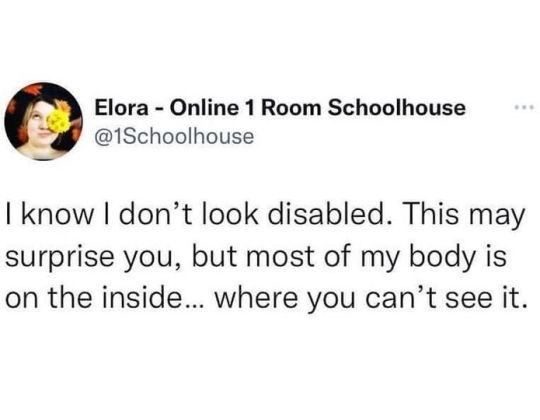
15K notes
·
View notes
Text
Please be sure to include people on the schizophrenia spectrum in conversations around disability awareness.
Schizophrenics belong, and should not be "othered".
#schizophrenia#schizophrenia spectrum#mental health#mental illness#psychosis#disability#actually schizophrenic#disabled#disability justice#disability rights#neurodiversity#neurodivergence#invisible disabilities#invisible illness
213 notes
·
View notes
Text
Physical exam: normal. Full blood panel: normal. Me and primary care doc: well we both know all is not "normal".
#it's funny because it's true#the struggle is real#disabled#spoonie#cripple punk#chronic illness warrior#invisible disabilities
93 notes
·
View notes
Text
The number one thing I wish the general public understood about autistic people at the moment is that our brains are fundamentally wired differently, from birth and via genetics, and our struggles are not because our parents have failed us in some way.
A well parented autistic child is one who's parents (and school if they have one) have adapted to and recognised their disabilities.
This is a child who has the opportunity to be physically and mentally healthier due to reduced chronic stress.
An autistic child who grows up having to pretend to be a neurotypical child is a child who has not been ideally raised.
Chronic stress in childhood causing mental and physical illnesses in autistic people is a very real and large concern.
Physical and mental health conditions are more common in autistic adults, and autistic adults statistically die younger.
This is purely my opinion - but the obvious stressors we deal with are increased childhood stress and trauma, which are known to impact adult health.
Adapting to autistic children's differences rather than denying them or using a behaviorist approach is a protective approach for their adult selves.
It's time to reframe how we perceive good parenting to include allowing disabled children to be disabled. ❤️
From Spectrumy at https://www.facebook.com/profile.php?id=100044510616450&mibextid=ZbWKwL (links to evidence in comments on original post)
#autistic#autism#neurodivergent#neurodivergence#invisible disabilities#trauma#teaching#parenting#accessibility
6 notes
·
View notes
Text
The thing about having an invisible disability is that you're under constant societal expectation to just be able to do everything every abled person can and after a while, after trying so hard to be like them, you start to think you are, that whatever was wrong with you had gone away and tell yourself to keep doing things that overstimulate and burn you out yet you press on because, "everyone else does."
This is why it's SO important that people become more aware of what traits about them, set them apart as neurodivergent and to raise acceptance of those unique characteristics and embrace them as who they are and that they are allowed to simply do whatever they're comfortable with. If only these two things were met, it'd remove the harmful goals imposed by neurotypicals and give NDs the freedom to not feel like they HAVE to meet them only to hopelessly fail over and over no matter how hard they try and go at their OWN pace.
You never know what someone's going through, so, if someone is really uncomfortable with something, please respect that.
14 notes
·
View notes
Text
Working with crutches?
So I have a few health issues, one of which being hEDS. I had one ankle that wouldn't stay in place but my doctor prescribed a custom brace and I was doing better. I got a job as a stocker and eventually got promoted to department manager, so now I stock the whole department take care of behind the scenes stuff.
However, the other day my "good" ankle came out and now has a "significant sized gap" between the leg and foot, I can't move it or put weight on it. The doctor has me in a boot and on crutches, not allowed to walk on it until I see the surgeon (I can't stand to put weight on it even if I was allowed). Problem is, I can't afford to be off work that long. I don't get sick leave or anything, I just lose out on any pay I miss from being out with sickness or injury
I messaged my boss, sent her a copy of the doctors letter and explained my situation, asking what accomodations are available. She never replied. So, I'm reaching out to you guys to see what ideas you may have so I can go back to work Tomorrow. The doctor's note technically says not to return until after I've seen the orthopedic surgeon but I can't afford to be off work that long. I've already missed two days of work and I'm not gonna be able to meet bills.
The bulk of my job is retrieving boxes of produce from pallets, putting it on a cart and rolling it to the section and putting it away. Excess goes in a back storage room. Everything from 50# bags of potatoes, boxes of bananas, boxes of tomatoes, etc. At the end of the day I clean the back room up, sweeping and wiping everything down, and then "check out" and throw away rotten or expired produce.
#chronic illness#chronic pain#chronic fatigue#ehlers danlos syndrome#chronically ill#pots#potsie#spoonie#fibromyalgia#actuallyautistic#crutches#ankle injury#chronic life#invisible disabilities#invisible disability#disabled#disability#actually disabled#disabilties#physically disabled
10 notes
·
View notes